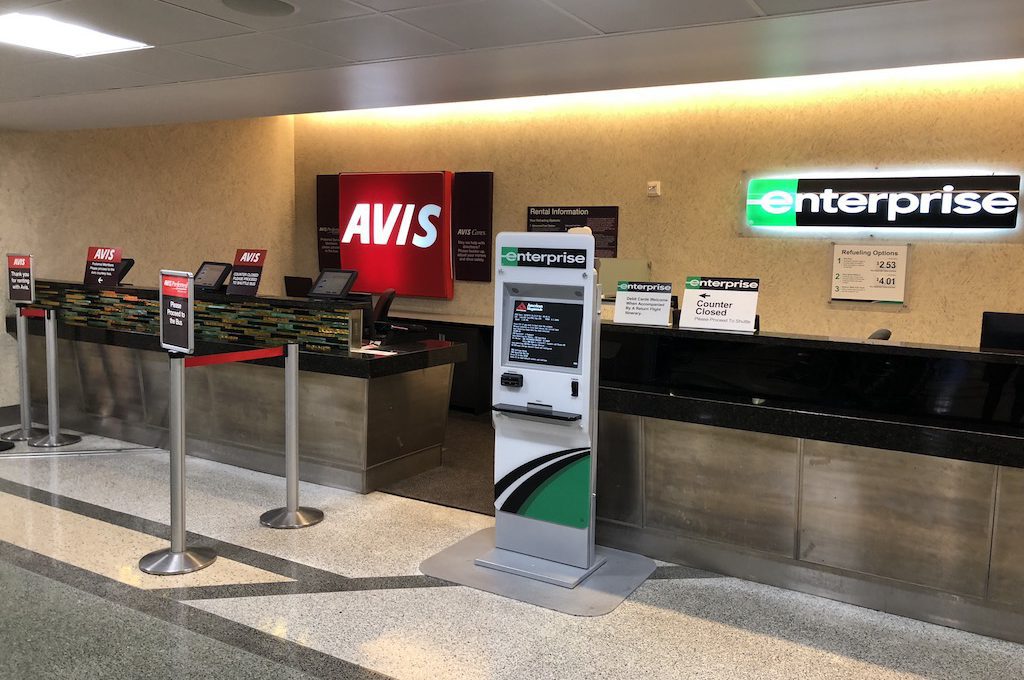

If you are planning on renting a car from Enterprise you will likely have to make the decision of whether or not to accept rental car insurance and other protections provided by Enterprise.
Depending on the type of vehicle you are renting and on your location these protections may vary but typically you will have the choice to choose from for four or five different protections.
In this article, I will break down what these protections are and why you may choose to decline these protections.
Table of Contents
Enterprise Rental Car Insurance contains a number of different protections that you can choose to purchase.
Each protection will protect you from liability or loss in a different way so you’ll want to be familiar with the differences in protection before choosing to rent your vehicle.
Tip: Use WalletFlo for all your credit card needs. It’s free and will help you optimize your rewards and savings!

Damage waiver (DW) also referred to as collision damage waiver (CDW) is what many people refer to as “rental car insurance.” It’s actually not insurance so a better term to describe it would be “rental car coverage.”
This coverage will protect you in the event of damage or theft to the vehicle.
The damage waiver will be optional and you can purchase it for an additional fee. This fee can vary dramatically based on your location and the type of vehicle.
You could be paying anywhere from $5 to $50 per day for it so it is vital that you understand how much you will be paying per day. (On average, I would expect to pay somewhere around $20 a day.)
Be on the lookout for restrictions in certain countries because you may find that coverage does not apply to places like Mexico.
Because of the additional expense involved with damage waiver I would highly recommend that you seek out a quality travel credit card that comes with collision damage waiver.
The go-to card for this benefit for a lot of people is the Chase Sapphire Preferred which provides primary rental car coverage.
Primary rental car coverage is very important because it means you will not have to file a claim with your auto insurance company.
The annual fee for the Chase Sapphire Preferred is only $95 so in many cases you can completely offset the annual fee just by using the collision damage waiver once or twice.
Tip: If using a card like that, be sure to decline the coverage from the rental car company or you could void your credit card coverage!
One last thing to note, your standard auto insurance policy may not cover you for all of the fees associated with an accident. For example, if you don’t rent through a partner or obtain CDW, USAA may not cover the following:
Personal accident insurance (PAI) provides the renter and the renter’s passengers with accidental death, accident medical expenses, and ambulance expense benefits.
So this coverage extends beyond damage or theft vehicle and actually protects you in the event you or any of your passengers are physically injured.
Once again the price for this coverage can range but typically you will be paying somewhere between $5 and $13 per day.
If your insurance provider already offers this protection then you will not need to duplicate it and you should feel free to decline it.
For example, my auto insurance via USAA covers accidents while renting vehicles so it doesn’t make sense for me to accept the protection from Enterprise.
The best way to get assurance about your coverage is to call up your car insurance company and ask about how your policy applies to rental cars.
Even better, ask them to provide you with a document outlining your coverage so that you could have something on-hand.
Supplemental liability protection provides the renter and any of the authorized drivers with up to $300,000 of combined single limit coverage for third-party liability claims.
SLP is primary to any other coverage and will respond to third party accident claims that result from bodily injury, including death, and property damage that arise from the use or operation of vehicle
So to help you distinguish this from the protections above consider the following example.
Let’s say that you drive your rental car into a steel post and really damage the vehicle but you were not injured nor was anybody else. Collision damage waiver coverage will likely protect you and you will not be liable for damage to the vehicle from the steel post.
But let’s say that when you hit that post you injured your back and had to call an ambulance to take you to the hospital. If you signed up for the personal accident insurance you should get coverage for your accidental medical expenses and ambulance expenses.
Now let’s say that you knocked over that pole and it injured someone else and now they are suing you. Well, if you have supplemental liability protection then you will be covered up to $300,000 from the third-party liability claim.
The exact way that this protection is set up is that Enterprise covers you up to the applicable minimum responsibility limit and then excess coverage kicks in from Zurich American Insurance Company.
This coverage will typically cost you between $8 and $17 per day.
Be on the lookout for some of the same restrictions such as this policy not applying in countries like Mexico.
Once again, your rental car coverage may already provide you with his protection, so be sure to check to your terms.
Roadside assistance protection is meant to help you out in situations where you have common roadside incidents such as running out of gas, or getting locked out of your vehicle. Enterprise will allow you to waive financial responsibility for these instances.
Something to note about this benefit with Enterprise is that roadside assistance can be added to a rental ticket at any time.
So if you are in the middle of your rental period you can simply call and add it to your rental ticket but you will have to have the vehicle inspected before getting the coverage added.
Some credit cards like the Chase Sapphire Reserve offer some really great roadside assistance. So once again if you choose the right travel credit card you can turn down these additional protections and save yourself some money.
These are all optional products that you can add in order to provide you with more protection as you hit the road in your rental car.
I personally never add these to my rental car tickets because I already have coverage for these needs from my car insurance policy and/or my travel credit cards.
This has allowed me to save hundreds of dollars in fees so I would recommend looking into the right credit cards so that you don’t have to worry about adding these on to your bill.
Daniel Gillaspia is the Founder of UponArriving.com and the credit card app, WalletFlo. He is a former attorney turned travel expert covering destinations along with TSA, airline, and hotel policies. Since 2014, his content has been featured in publications such as National Geographic, Smithsonian Magazine, and CNBC. Read my bio.